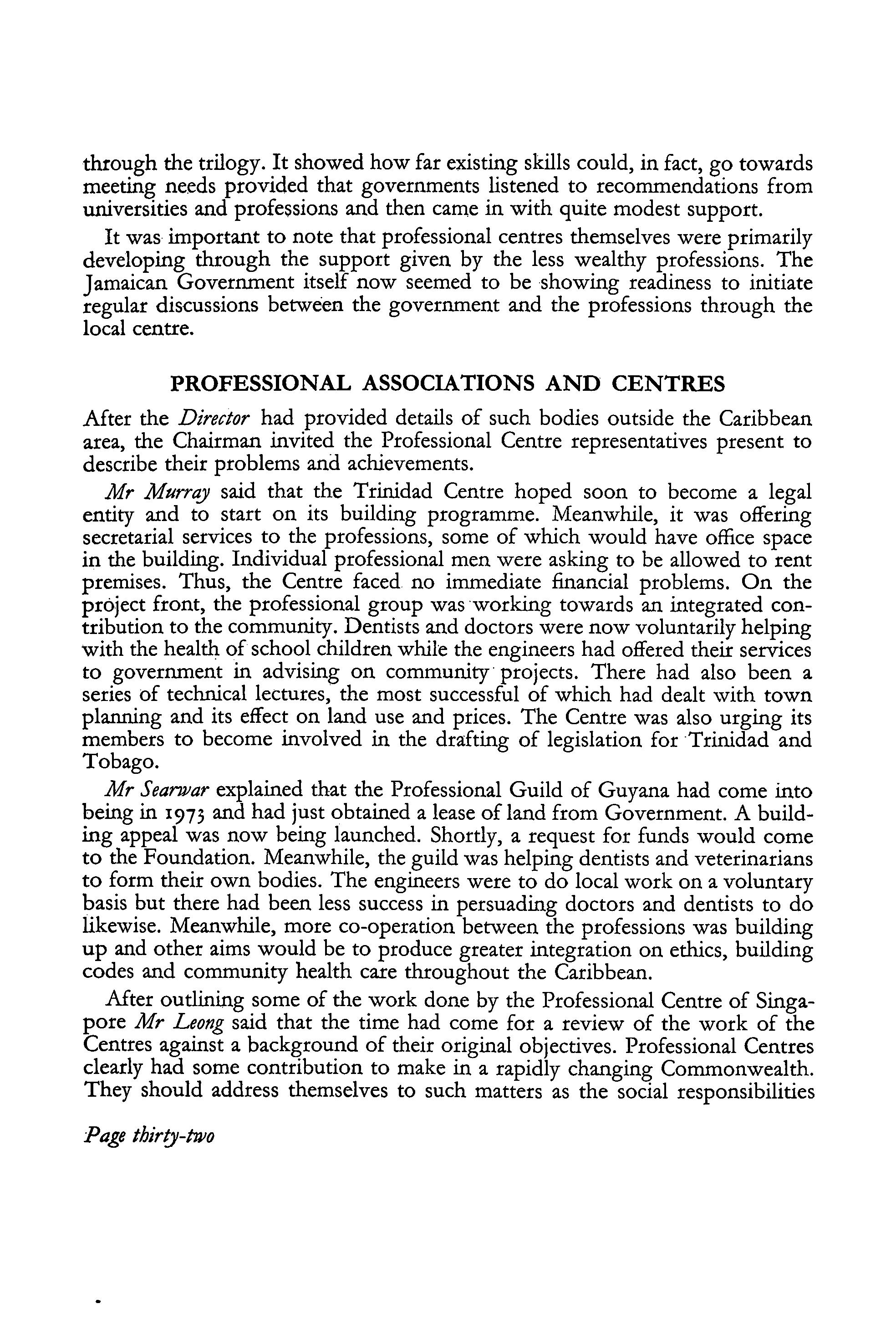
26 minute read
Annex A - Keynote address by Sir Egerton Richardson
through the trilogy. It showed how far existing skills could, in fact, go towards meeting needs provided that governments listened to recommendations from universities and professions and then came in with quite modest support.
It was important to note that professional centres themselves were primarily developing through the support given by the less wealthy professions. The Jamaican Government itself now seemed to be showing readiness to initiate regular discussions between the government and the professions through the local centre.
Advertisement
PROFESSIONAL ASSOCIATIONS AND CENTRES
After the Director had provided details of such bodies outside the Caribbean area, the Chairman invited the Professional Centre representatives present to describe their problems and achievements.
Mr Murray said that the Trinidad Centre hoped soon to become a legal entity and to start on its building programme. Meanwhile, it was offering secretarial services to the professions, some of which would have office space in the building. Individual professional men were asking to be allowed to rent premises. Thus, the Centre faced no immediate financial problems. On the project front, the professional group was working towards an integrated contribution to the community. Dentists and doctors were now voluntarily helping with the health of school children while the engineers had offered their services to government in advising on community projects. There had also been a series of technical lectures, the most successful of which had dealt with town planning and its effect on land use and prices. The Centre was also urging its members to become involved in the drafting of legislation for Trinidad and Tobago.
Mr Searwar explained that the Professional Guild of Guyana had come into being in 1973 and had just obtained a lease of land from Government. A building appeal was now being launched. Shortly, a request for funds would come to the Foundation. Meanwhile, the guild was helping dentists and veterinarians to form their own bodies. The engineers were to do local work on a voluntary basis but there had been less success in persuading doctors and dentists to do likewise. Meanwhile, more co-operation between the professions was building up and other aims would be to produce greater integration on ethics, building codes and community health care throughout the Caribbean.
After outlining some of the work done by the Professional Centre of Singapore Mr Leong said that the time had come for a review of the work of the Centres against a background of their original objectives. Professional Centres clearly had some contribution to make in a rapidly changing Commonwealth. They should address themselves to such matters as the social responsibilities Page tbirtji-two
of professionals and the contribution of professionals towards the economic progress of their country.
At this point, Dr Beaubrun spoke as President of the Commonwealth Medical Association and with reference to the Caribbean Medical Council. Both bodies were having success in influencing governments, particularly over the delivery of health care as a right rather than a privilege. He added that those most in need of professional centres were small territories such as the Windwards, whose professions would greatly gain from being able to work through a coordinating Secretary. There was, thus, an obligation on the member countries in the Caribbean to ensure that the smaller countries paid at least a token sum to the Commonwealth Foundation. There was need for an inter-disciplinary approach to medical problems at both professional and government levels and for further training in the organization of the professions. As to the Commonwealth-wide bodies, there was no right implied of interference in national affairs. But they could and did work to strengthen fundamental principles and to raise minds above national- prejudices, thus providing guidelines for the national bodies. The associations could also serve as mediators and repositories of information.
For the Commonwealth Library Association Mrs Fray expressed her anxiety to co-operate with other Professional groups. One danger experienced so far by her Association was that of professional identity relating particularly to the large number of professionals working in the Civil Services of the newer world. She supported points made earlier on the need for further sub-professional training courses and for support for Professional Centres. She also inquired whether Regional Commonwealth Bodies were essential in areas such as the Caribbean where international professional ones already existed.
Returning to the problems facing Professional Centres, Dr Amiel said that one apparent misconception which Jamaica had faced at the outset was that they had been geared to help the smaller, weaker bodies to consolidate their base and then to phase themselves out of existence. The Jamaica Centre had challenged this view, their own opinion being that centres must, on the contrary, be on-going bodies aiming at more and more professional integration. The Centre had also had to combat the suspicion that it helped to submerge the identities of individual professional societies. One lesson learnt had been that there was a great lack of administrative know-how. This added to the need for a strong central secretariat to help with the administration and accounting tasks of many local societies. Continuing, he said that a Professional Register for Jamaica was in preparation. Following the consolidation of the Centre's base, the next stage would be to move onwards and outwards into the community with e.g., careers clinics which could be taken into schools throughout the island.
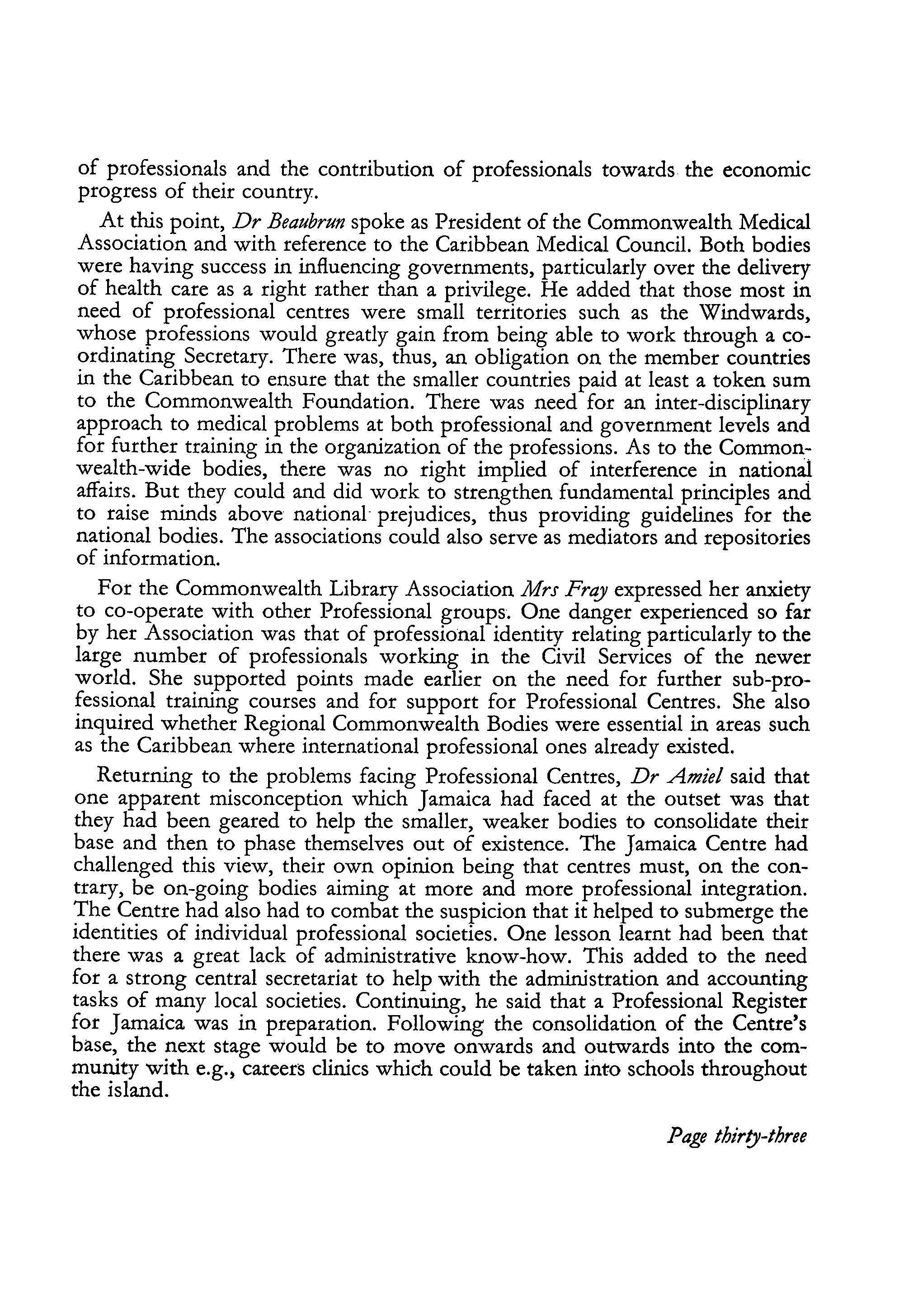
Page thirty-three
The Chairman then invited Dr Chhabra to speak on the problems of University Grants Committees. Dr Chhabra pointed out that there appeared to be no comprehensive view within the Commonwealth on the role of U.G.C.s, their function, etc. Possibly, the Commonwealth Foundation could think of organizing a seminar on this subject. Sir George Cart/and, Mr Grffiths and Dr Macdonald fully supported such a proposal. Further discussion suggested that the theme of any such meeting would have to be defined with care after full discussion with the Chairmen within the Commonwealth of the several committees or their relative equivalents. Particular points made were that there was variation in staffing, structure, systems and methodology among such organizations; that in Britain and Australia, U.G.C.s were drifting increasingly towards the Government viewpoint whereas in Canada, the reverse was happening. The broad conclusion was that subject to certain notes of caution, the organization of such a seminar, whether under Foundation auspices or with Foundation funds would be welcome but that it would be wise to restrict its remit to the mechanism of U.G.C.s throughout the Commonwealth.
There then followed a general discussion on the form which the final recommendations and conclusions of the Seminar might take.
Emerging from these discussions was the recommendation that the Commonwealth Foundation should in 1976 organize a meeting of representatives of Professional Centres primarily to review their achievements, problems and mutual interaction in the professional field throughout the Commonwealth. It was also suggested that the Commonwealth Foundation might consider the possibility of encouraging the growth of a modified type of Professional Centre suited to the needs of the professions and the public in remoter or less developed areas of the older Commonwealth.
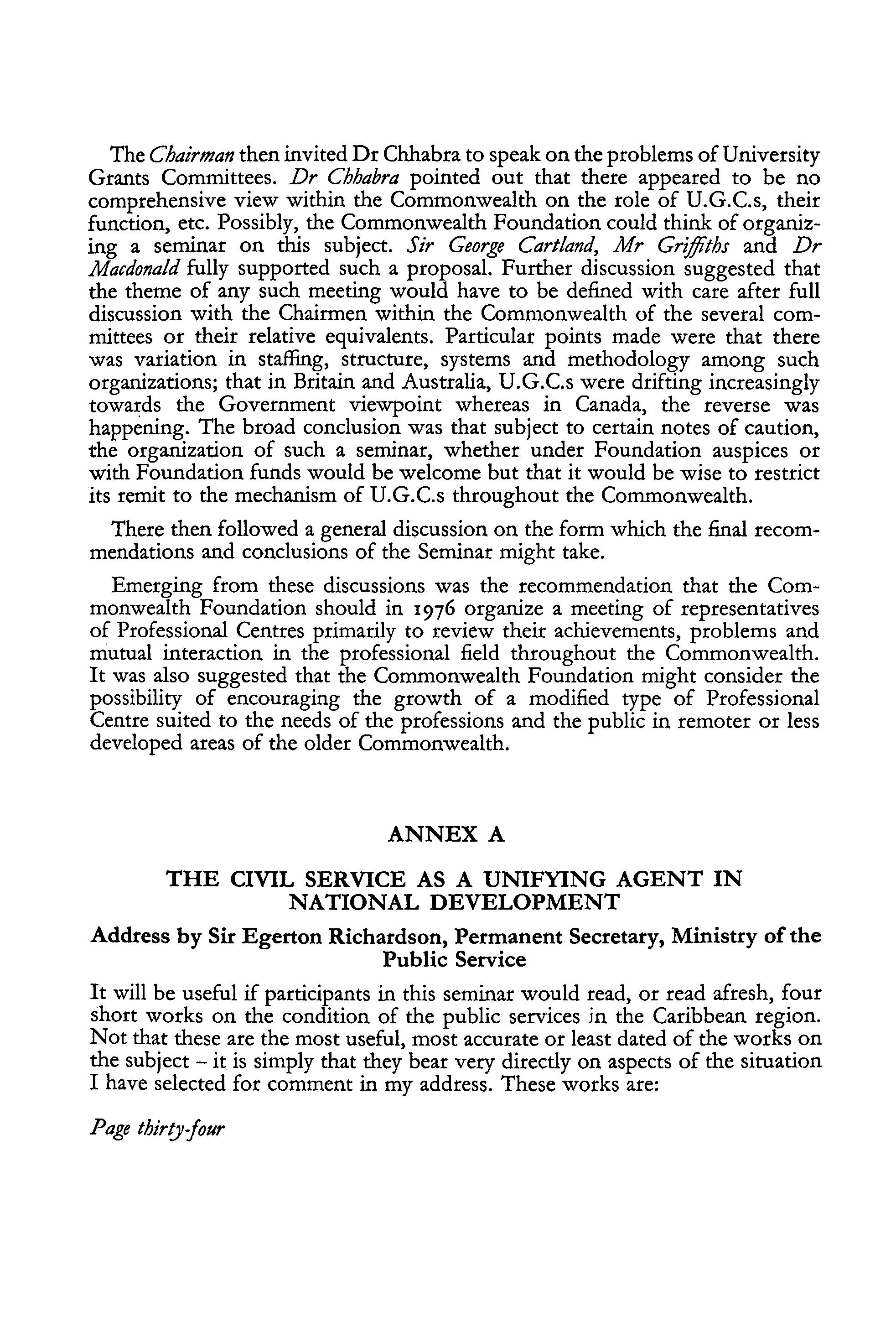
ANNEX A
THE CIVIL SERVICE AS A UNIFYING AGENT IN NATIONAL DEVELOPMENT
Address by Sir Egerton Richardson, Permanent Secretary, Ministry of the
Public Service
It will be useful if participants in this seminar would read, or read afresh, four short works on the condition of the public services in the Caribbean region. Not that these are the most useful, most accurate or least dated of the works on the subject - it is simply that they bear very directly on aspects of the situation I have selected for comment in my address. These works are: Page thirty-four
i. 'The Environment of Commonwealth Caribbean Bureaucracies', by G. E.
Mills, in International Review of Administrative Sciences, Vol. 39, 1973
No. i. 2. 'Reform of the Public Services - Problems of Transitional Bureaucracies', by C. A. P. St Hill, in Social and Economic Studies, Vol. i, No. i, March
1970.
4. . 'The Role of Statutory Boards in the Political Process in Jamaica', by Edwin Jones, in Social and Economic Studies, March 1970- 'Some Notes on Public Service Commissions', B. A. N. Collins, in Social and Economic Studies, Vol. x6, 1967.
NATIONAL DEVELOPMENT For the purpose of this address I propose to take the term 'National Development' in its widest sense. I take it therefore to include not only economic expansion and the achievement of higher standards of living, but also the achievement of a greater capacity by the majority of the people of the nation to make the decisions which determine the shape of their future economic and social environment. It includes the growth of a heightened awareness of national identity, a fuller recognition of cultural roots and a blossoming of cultural expression. In the Caribbean circumstances it must now obviously include also the process of effecting a fundamental change in the status and influence of particular economic and social groups within the society. 2. National development proceeds under the direction of national Governments. In the words of U.N. experts: 'The twentieth century . . . is witnessing an extension of government functions beyond all precedent. The concept of the service State has been almost universally accepted. Governments have taken upon themselves the responsibility for the direction and utilization of manpower, natural resources and the fast-growing technology of the modern world for the creation of an environment conducive to widespread economic and social well-being. The demands of the peoples upon their Governments have become insistent. more and more, particularly in developing lands, the Governments are looked to as the agencies to meet these urgent demands and to devise new forms of public administration to overcome social and economic deficiencies.' It is now widely recognized that the days of laisser-faire are long past . when Governments, in developed and developing nations, could limit their roles to fixing and monitoring general rules of social relationships and to providing basic services and in-entives for entrepreneurs. The development Page thiqy-five
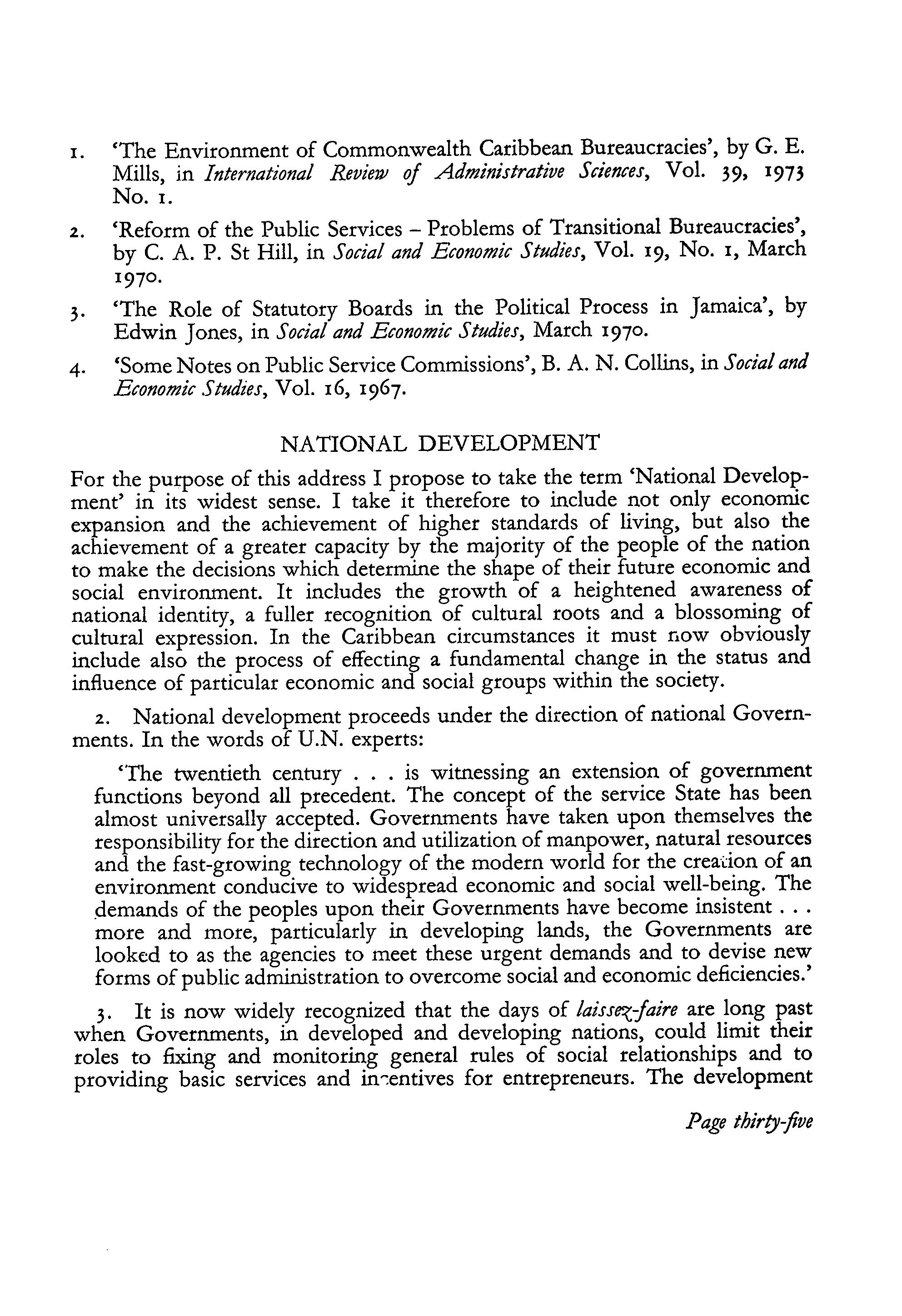
process goes on, however, within legal and psychological frameworks which are :determined partly .by custom and partly by the political philosophies of successive governments, including but not restricted to the government of the day. It is particularly fashionable in newly independent states to speak of the traditional framework within which development must often proceed as though it were at best unnecessary baggage and at worst a positive hindrance to progress. Whatever opinion one may hold about the value of the framework we have inherited, we should beware of a facile dismissal of ideas that are ingrained in the minds of people, especially people whose effective performance is indispensable to economic expansion and often to social development also, so long As the legal and social framework remains largely unchanged.
THE MANAGEMENT OF DEVELOPMENT . The development process must be managed. That part of it which. is in private hands has to be stimulated, regulated and directed into definite channels. That part of the process which Government itself chooses to operate must be run. The political leaders cannot single-handedly manage it by themselves. By tradition our system supplies them with cadres of permanent officials whose function it is to carry on the day-to-day management of public affairs in its varied aspects and ramifications. The duties of a Member of Parliament are already virtually whole-time. Certainly, if they are properly discharged they can occupy usefully the whole of his working time. The duties of Cabinet Ministers are certainly whole-time. The Minister with portfolio who, in our system, must ordinarily be a Member of Parliament, already combines two virtually whole-time jobs, and it is against this background that we should examine the effort of the Minister who occasionally tries to operate:as though he were his own administrative chief. In saying that the development process takes place within a framework determined by tradition as well as by the political philosophies of successive governments, I wish to emphasize the fact that it is not the philosophy of the current Government only which determines the pace nor even the direction at times of the current development process. So obvious is this fact that it is almost a truism to state it. Yet how often do we act and speak as though we have forgotten that no Government, however revolutionary, can change overnight the whole framework within which development takes place. An understanding of. the tradition which today infuses, or hinders, the development Process at any particular time is one of the contributions which the permanent Civil Service should bring to the management of development under any particular regime.
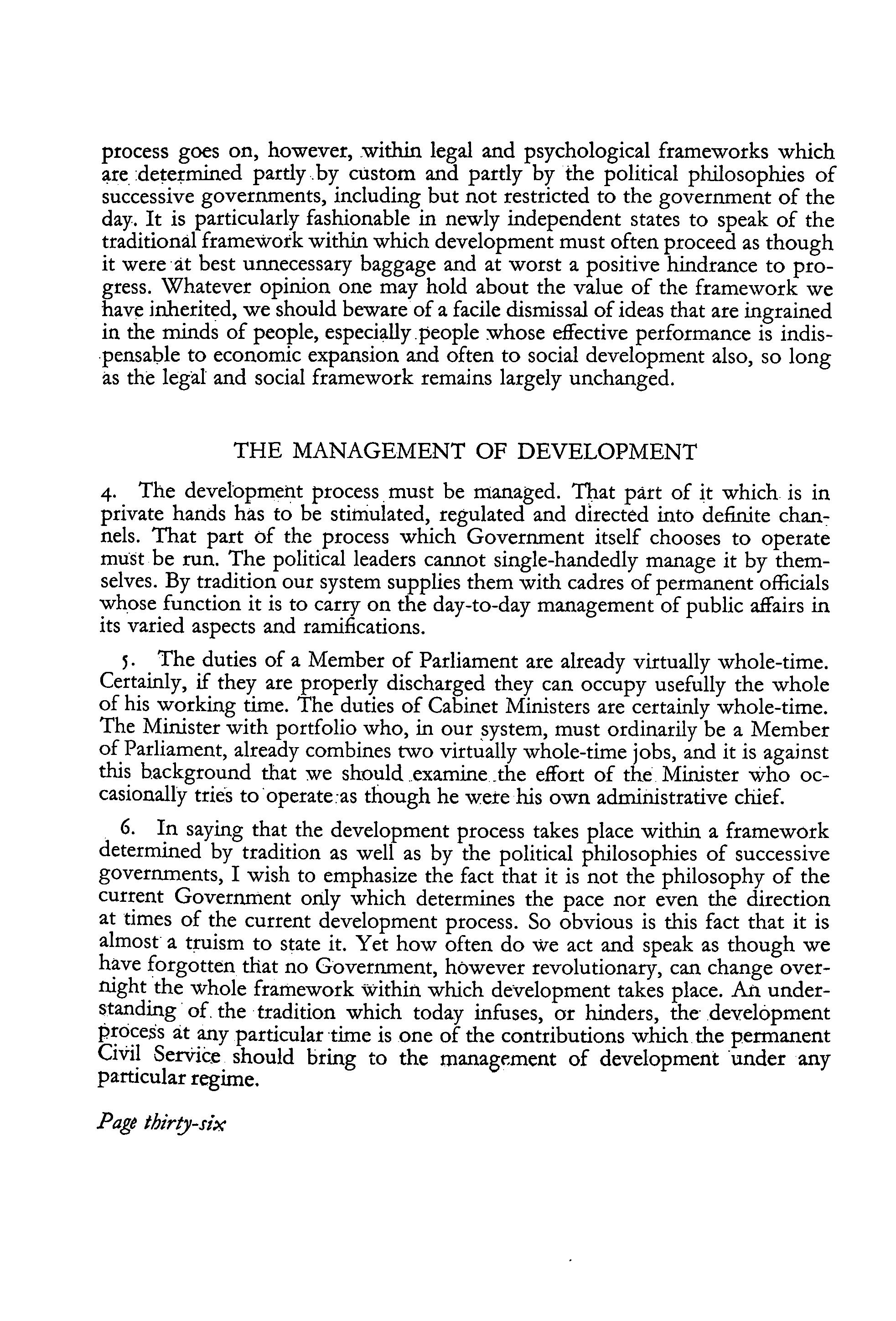
Page thiriy-six
The permanent officials under our normal constitutional 'arrangements are. charged with the duty of. the day-to-day management of those public affairs which are entrusted to a Minister; This is not an artificial function, it is one which must be discharged in any organized society, and the discharge of this function requires an expertise entirely distinct from that ordinarily possessed by academics and not always possessed by members of the recognized professions, although the Public Servant's expertise, certainly that of the upper ranks of the Service, comes very close to professional expertise. I offer no apology for the Public Officer's image of himself, or for his view of the role 'which he discharges towards the rest of the community. We claim to be experts in the management of public affairs at the administrative level. We see ourselves, therefore, firmly installed at the centre of the development process. We do not believe there is a viable alternative - to the bureaucracy in the discharge of ,the an management function. Other alternatives have been canvassed, we know, d from time to time attempts have been made to replace the bureaucracy with short-term Public Servants of one - type or another. We are convinced, however, that the longer the period the short-term employee spends in public service the closer will the pattern of his outlook and his operating methods approach to those of the established bureaucrat. In the midst of his pressures the Caribbean bureaucrat tends to remind himself that his function is as old as organized Government, that his role had to be discharged in Egypt and in Babylon and in Persia, under Napoleon and under Hitler, as well as under Jamaican Chief Minister, Norman Manley.
Incidentally, the important part of that function is organizing and securing accountability for the conduct of public affairs, an element which is too often made light of until administrative disaster overtakes a government. It is interesting to note that the sacred chronicler in distilling for the record the essence of the duty which Daniel was assigned when he was made the first of the presidents in Belshazzer's kingdom, said it was ordered that the provincial governors should account to him so that the king's business might suffer no damage. As a principal agent in the development process the Public Service can serve as a unifying agent in both formulation and implementation of policy, although its role in the formulation of policy is the less definitive. It is traditional in the Service to expect that political leaders will obtain their inputs in policy formulation from as many and as varied sources as they wish. The public service claims some proficiency in the balancing and synthesis of conflicting policy advice and likes to see full use made in this proficiency. I must admit immediately, however, that the coordinating and unifying role of the Public Service in policy formulating is often haphazard and inadequately discharged. The reason is not far to seek.
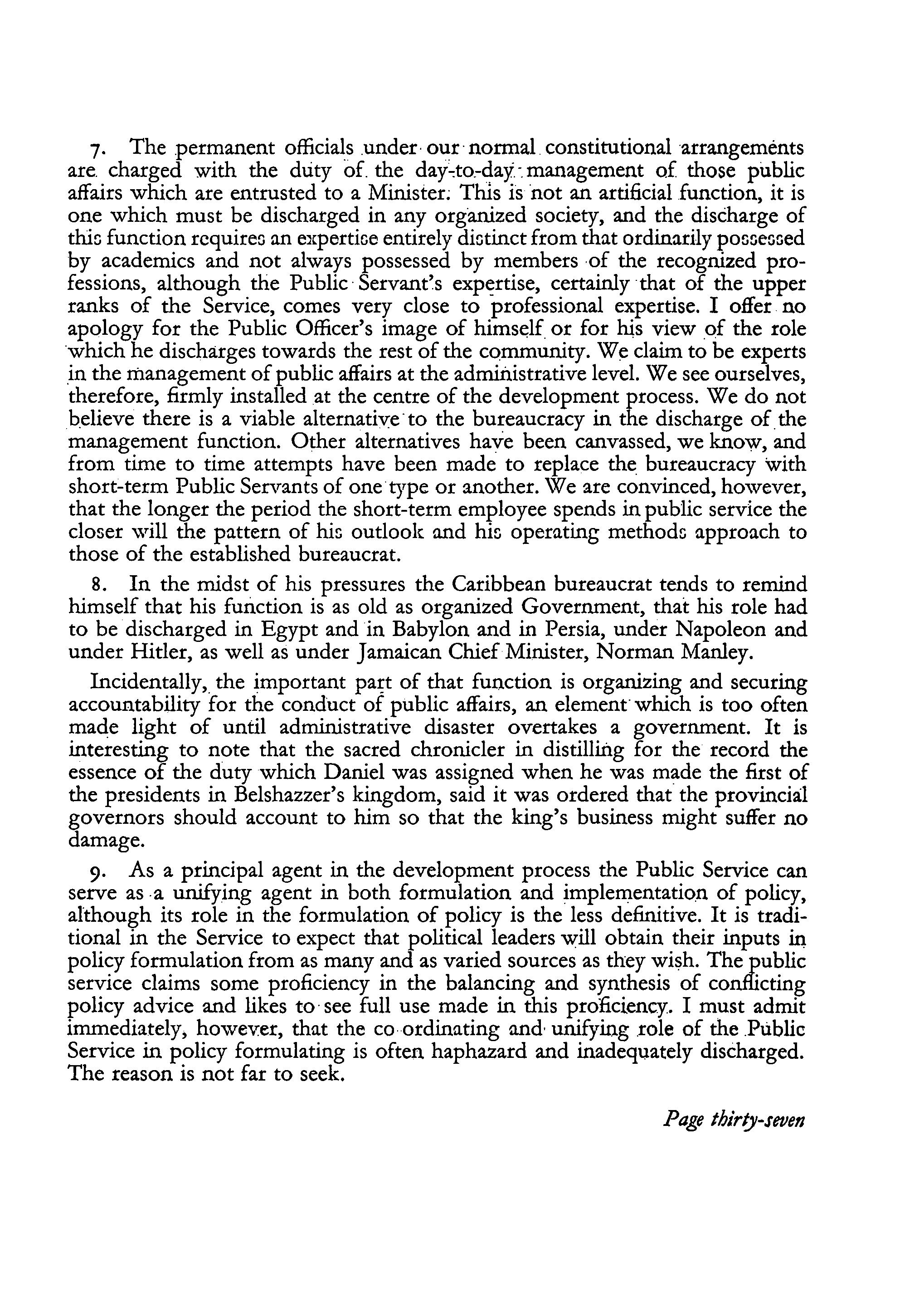
Page Ibirty-seven
Analysts and commentators on the process of public administration in times of change tend to make a simplistic distinction between formulation and implementation of policy, making formulation the responsibility of the political leadership and implementation the job of the Public Service. The situation in real life is not so simple. Seldom does a new Government come to office with much beyond broad policy ideas, whether for 'new projects and services, or to pursue new directions in existing services. Often these broad ideas are born of knowledge only of niin defects and inhumanities in in, existing service. 10. There often is a world of difference, however, between the delineation of broad lines of a new policy and the ability to begin implementation of that policy. The vital process of working out the details and the implications of the broad policy should always follow before implementation is allowed to begin. In my view this working out of details is an essential part of the process of policy formulation. Great harm is done when the reality and necessity of this intermediate phase is glossed over, and when the time it demands is allowed to be ignored in the citizen's mind.
When the Public Service is encouraged to believe that formulation is the politician's exclusive preserve, and implementation that of the bureaucracy, when the public ignores. the intermediate phase of working out broad policy the Public Service often fails to take the initiatives it ought to, or to assume the leadership it should, in organizing the working-out process. Inputs from academics and professions are not always called for, or if invited are sought on an ad hoc and disorganized basis.
A wide opportunity exists to influence public opinion in this region about the vital necessity to work out the details and implications of broad policy, and about the opportunity offered by this process to the universities and the professions (as well as to the public and the pressure groups) to take part in this phase of the policy forumlation.
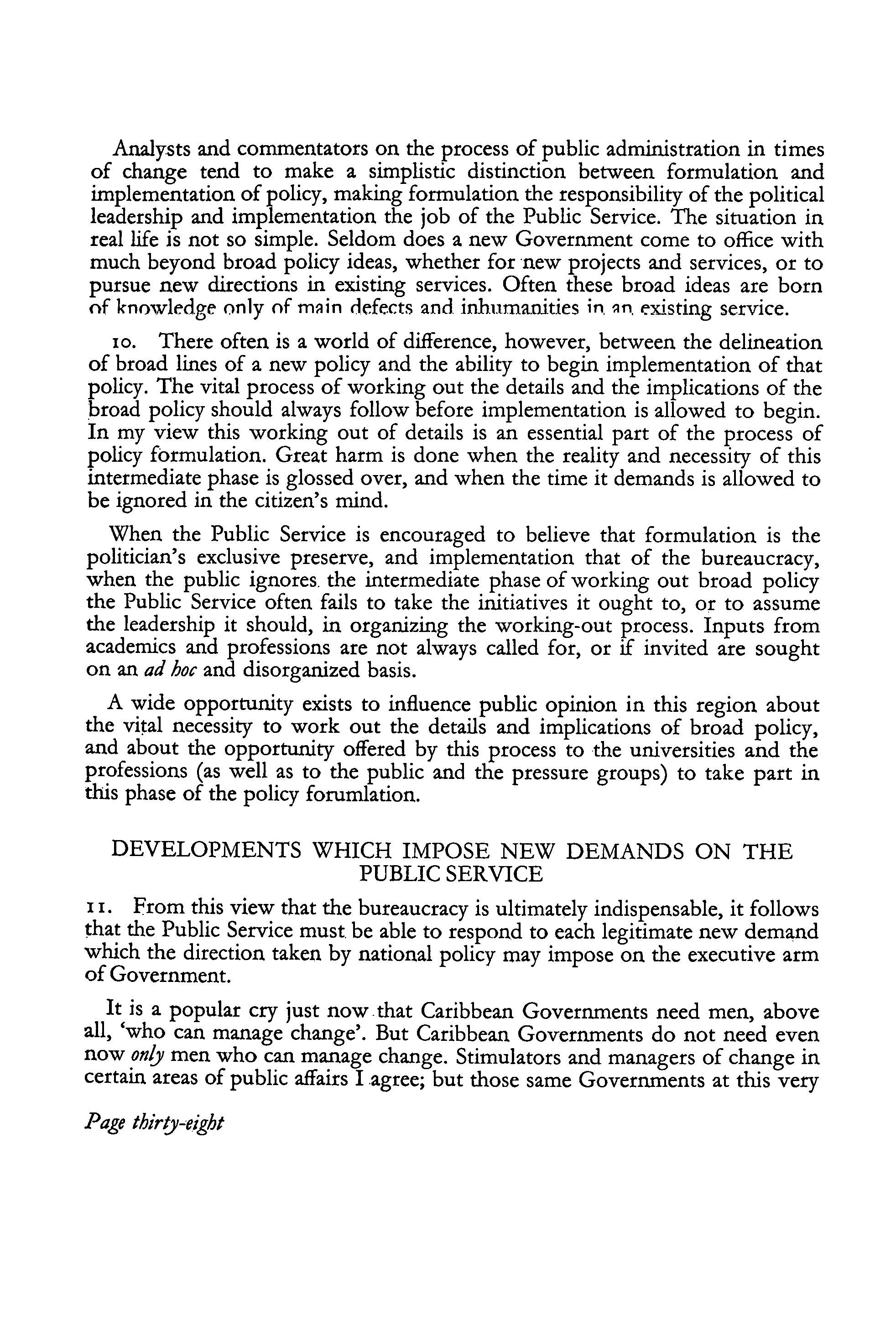
DEVELOPMENTS WHICH IMPOSE NEW DEMANDS ON THE PUBLIC SERVICE i i. From this view that the bureaucracy is ultimately indispensable, it follows that the Public Service must, be able to respond to each legitimate new demand which the direction taken by national policy may impose on the executive arm of Government.
It is a popular cry just now that Caribbean Governments need men, above all, 'who can manage change'. But Caribbean Governments do not need even now only men who can manage change. Stimulators and managers of change in certain areas of public affairs I agree; but those same Governments at this very Page thirly-e:ght
moment need men who in other areas of public affairs can manage conservation and secure the maintenance of the status quo.
I prefer therefore to express the challenge confronting the bureaucracies as a challenge to produce the personnel, the attitudes and the operating methods which are equal to each legitimate demand that is made on the Government. iz. Let us look quickly now at a few of the developments which impose new demands on the service. I will pass over developments in mere technology, such as the widespread use of computers in almost every area of modern life and activity, and I ask you to look at a few which, in my judgement, make peculiar demands upon the bureaucracy in the Caribbean region: the growing dependence of commerce and industry on government (especially on action by officials) for the day to day conduct of its own business; the rapid expansion in the areas of economic and social activity over which governments now assume direct control; the new militancy in trade union leadership and, to be truthful, also in trade union rank and file; the rapid spread of egalitarian ideas and their effect on the citizen's view of the kind of service he is entitled to expect from the Public Servant; the general political decision that national development is not truly development unless it effects a radical transformation of the society. Since the last world war, business relations have grown in complexity and sophistication, and international developments have required that national governments answer more directly for the economic relations between their own people and those of other countries. The businessman therefore now progressively demands that our governments provide themselves with officials who are sensitive to business needs and who will instinctively endeavour to ensure that necessary control places the minimum of obstacle and delay in the way of the conduct of business. As sectors formerly treated as the preserve of private enterprise have taken over in whole or in part, it is easy to see that the governments will need, in order to operate efficiently the enterprises taken over, men with knowledge and experience shaped in those identical areas of the private sector, and that the expertise required is unlikely to be found already in the possession of permanent officials. To my mind the logical measure which ought to be taken in such circumstances is, to bring the people with the expertise required into the ranks of the Public Service. The conditions of employment now ruling in the central Page thirty-nine
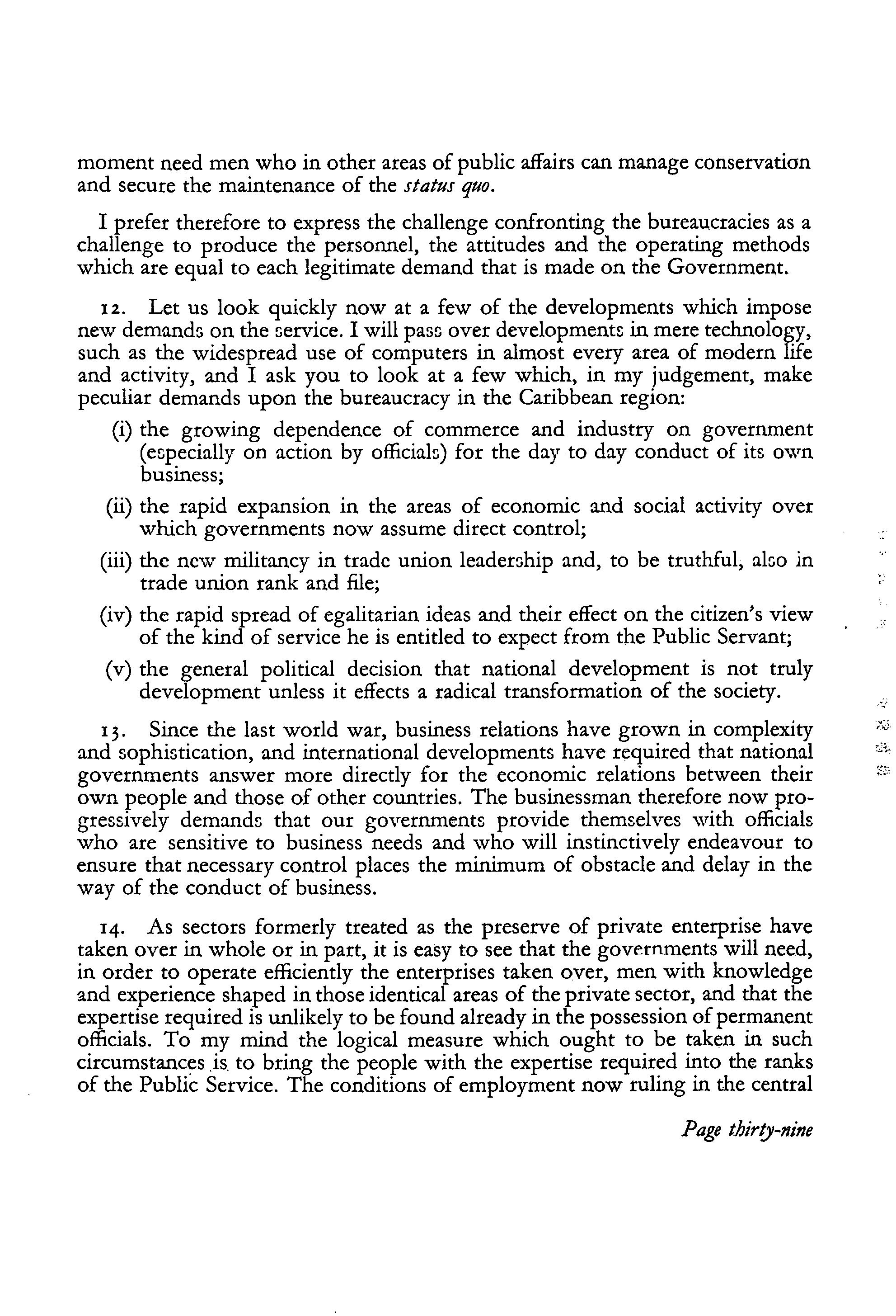
Civil Service will have to be. adjusted to accommodate personnel with this background.
Apparently, however, just the opposite course is often taken by government whichhas expanded its area of direct control in commerce or in industry. The reasons must have .little to-do with the conditions of employment of staff.. The widespread and continuing use of statutory boards or government 'corporations must be explained in 'political :terms.. Whilst the main' attractiveness at the official level of service in a statutory board is its freedom from parliamentary control from Government's financial and-personnel regulations, and its usual ability to offer remuneration above those ruling in the Central Government Service, I believe it' is important that the Collins analysis be taken further. In this process I should like to see a distinction made between those statutory bodies which offer an independent political constituency and those which do not. 15 . A new kind of Public Servant who displays both a new attitude towards organized labour and who can employ a new technique in the management of relations with workers is coming to the fore with the new developments I have mentioned earlier in the behaviour and demands of organized labour and representative Staff Associations. No longer too does the average citizen look to the public official, especially an official with whom he deals across the desk or the window day by day, as a benevolent dispenser of governmental favour. He tends to demand every service as of right; and an attitude on the part of the public official consistent with the citizen's view of his rights an attitude free from patronizing overtones, is an essential part of' the equipment of those who now deal directly with the public. Where policy decides that the power and influence of particular economic groups must change in favour of other groups; that, for example, the cost of ownership of property must increase and the returns from that ownership diminish; if the government decides to raise the real income of the lowest paid groups at the immediate expense of the rest; then a new challenge is thrown to the Public Service. This is not a challenge, however, to produce a new kind of expertise or 'to adopt a new technology. It is a challenge to make a change in technique, and adopt new attitudes towards traditional rights. The new demands -being made on the Public Service which I have identified so far are demands which can be met by two kinds of response: (i) changes in conditions of employment to accommodate short-term entrants with special business or technical expertise; (a) re-education to produce changed attitudes towards rights,, new sensitivities towards people and an accelerated tempo in the conduct of public business.
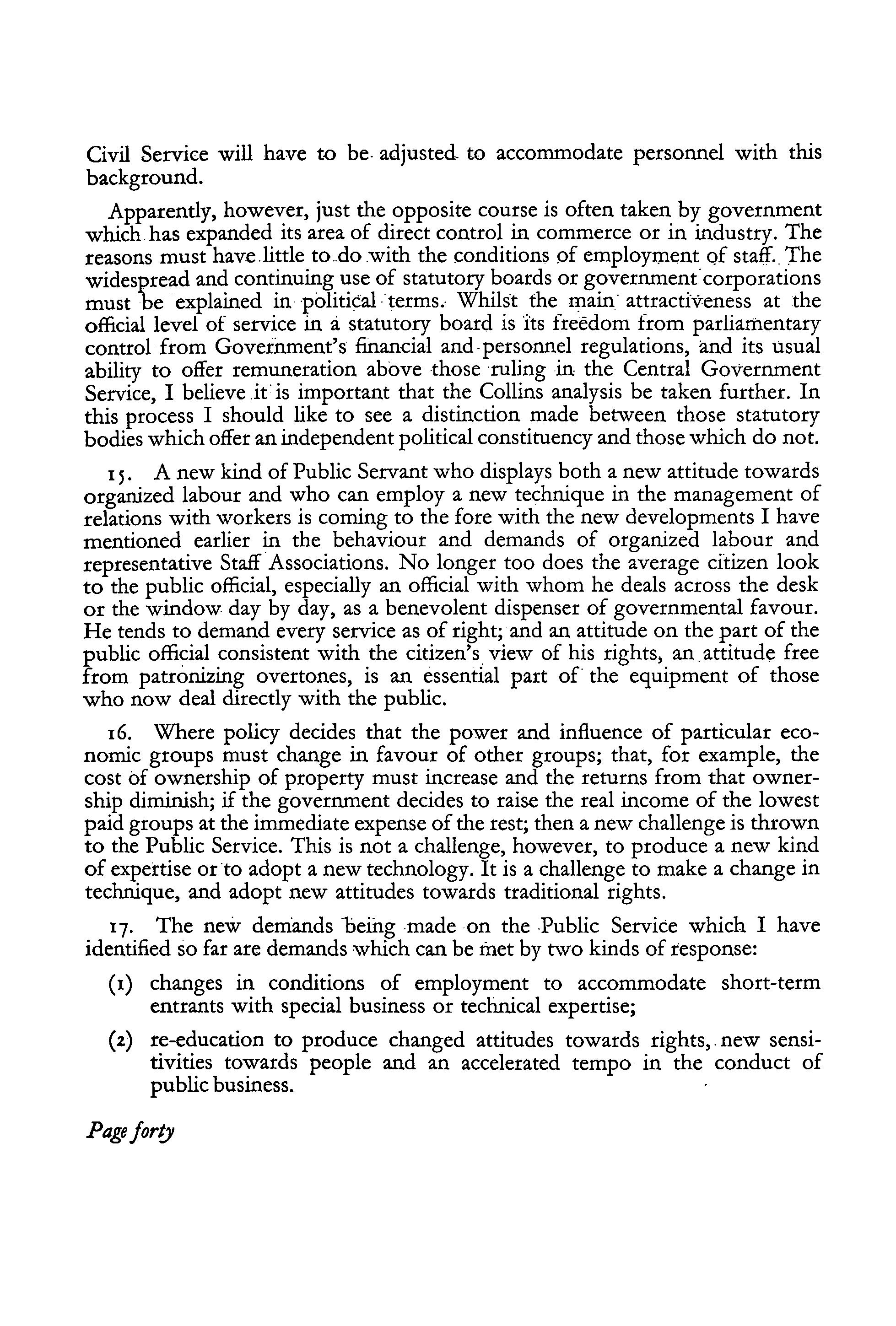
Page for*
18. The last of the external changes to which I wish to draw attention as making new demands on the Public Service is the widespread adoption in business and commerce of modern techniques of management. The Public Service as a whole has been deficient in managerial expertise for a very long time, but the accelerated tempo in the conduct of business and the policy decision that society has got to be transformed have more starkly revealed this deficiency.
REFORM IN JAMAICA
i 9. It can be said, I think, that in the Caribbean the Public Service is aware of its more glaring deficiencies, is searching out its faults with some outside aid and finding them.
Here in Jamaica, a programme of reform in the Public Service has begun. It is a programme of self-reformation. A Ministry of the Public Service has been set up. A general classification of jobs in central and local Government has been carried Out and in the staff of statutory boards is almost complete. The new structure brings together in one service-wide grouping top management posts whether administrative or professional in all Government Ministries.
Pay differentials are being subjected (against great odds) to rational examination.
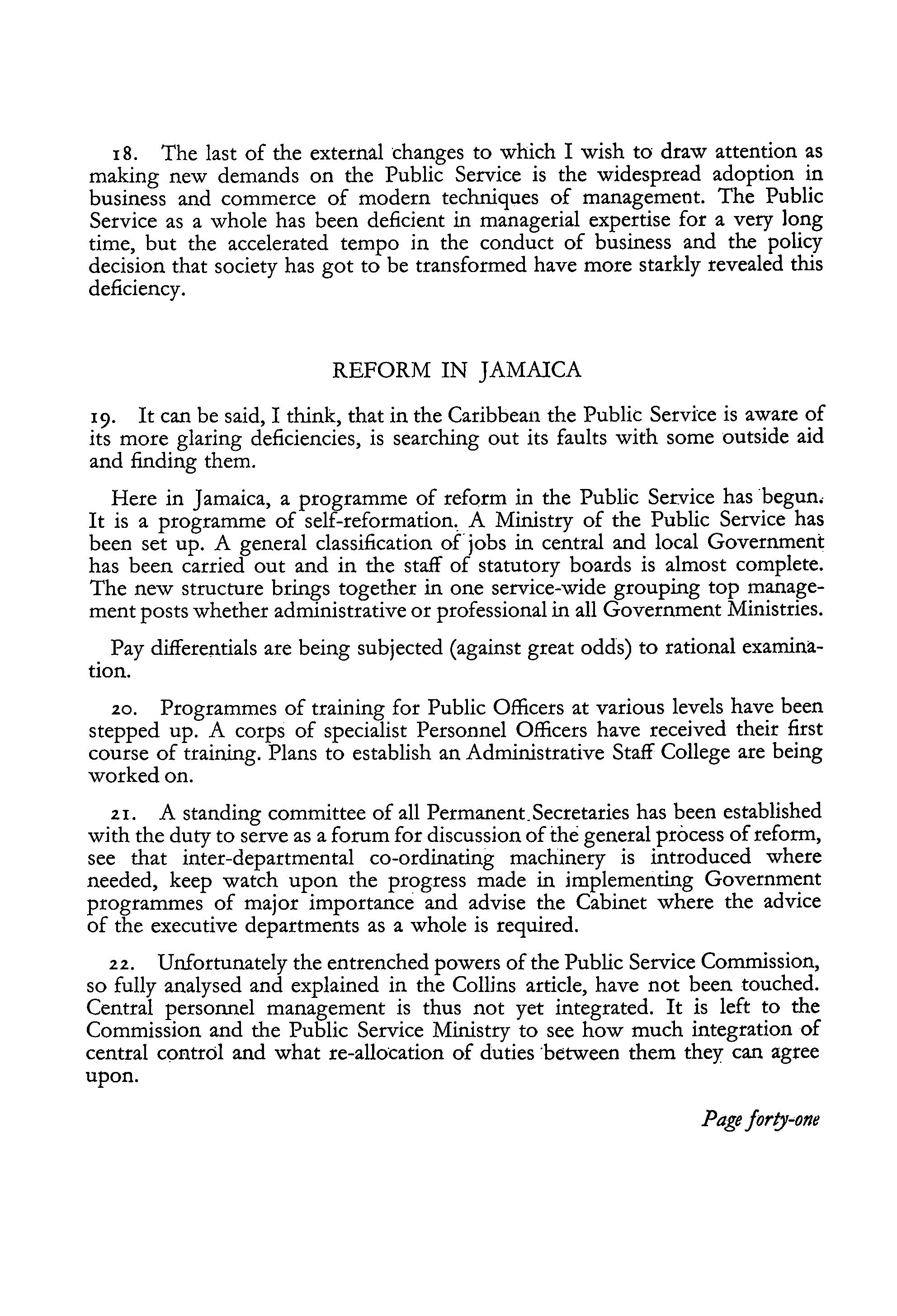
Programmes of training for Public Officers at various levels have been stepped up. A corps of specialist Personnel Officers have received their first course of training. Plans to establish an Administrative Staff College are being worked on. A standing committee of all Permanent Secretaries has been established with the duty to serve as a forum for discussion of the general process of reform, see that inter-departmental co-ordinating machinery is introduced where needed, keep watch upon the progress made in implementing Government programmes of major importance and advise the Cabinet where the advice of the executive departments as a whole is required. Unfortunately the entrenched powers of the Public Service Commission, so fully analysed and explained in the Collins article, have not been touched. Central personnel management is thus not yet integrated. It is left to the Commission and the Public Service Ministry to see how much integration of central control and what re-allocation of duties btween them they, can agree upon.
Page forty-one
CO-OPERATION WITH THE PROFESSIONS 23. I must not forget that the main concern of this series of Seminars is the role of the professions in national development. Since my subject today is the Civil Service as a unifying agent in national development, I have assumed that participants are primarily interested in the role the Civil Service can play in unifying the activities of the professions and the universities. Some time has been devoted in this address to propounding the view that the Public Service is the central executive agent in national development, from which it follows that the professions and the universities can make a substantial contribution to that development by assisting the Public Service either to effect internal improvements or co-operate in the performance of tasks for which the Service carries the main responsibility. I propose now to present a selected list of areas in which, in the view of the Public Service, assistance and co-operation from the Universities and the Professions are perceived to be needed. I hope that other participants from the Public Service will make their additions to this list. The participants from Outside the Public Service should then find it easier to form their own judgement as to whether our perceptions are adequate. Let it be said at the outset that a substantial measure of co-operation in national development is already being provided by the Professions in the performance of professional work, advice on the framing of national policies and assistance in the implementation of national plans. When the role of the Public Service in working out the details of national policy is better recognized and allowed for, it is certain that the measure of assistance the professionals provide will increase. Speaking for Jamaica, we welcome the establishment of the Professional Centres and note with keen interest the number of constituent professional associations already identified with the two Caribbean Centres. The management of the Centres should not be disappointed, however, if the views of the Centre as such or of all the professions as a whole, are not sought very often by Governments. The fact is that Governments are likely to invite the opinion of the Centre only on the very broadest questions such, for example, as the best means of establishing machinery for co-operation between Government and the Professions in preparing development plans. Governments are more likely to seek the advice, from time to time, of a particular profession or group of professions. When such advice is sought the Centre can perform a valuable service to Government and to its constituent Associations if it can ensure: (i) that advice is provided only after careful study is given by the professional body to the questions posed, and Page forty-iwo
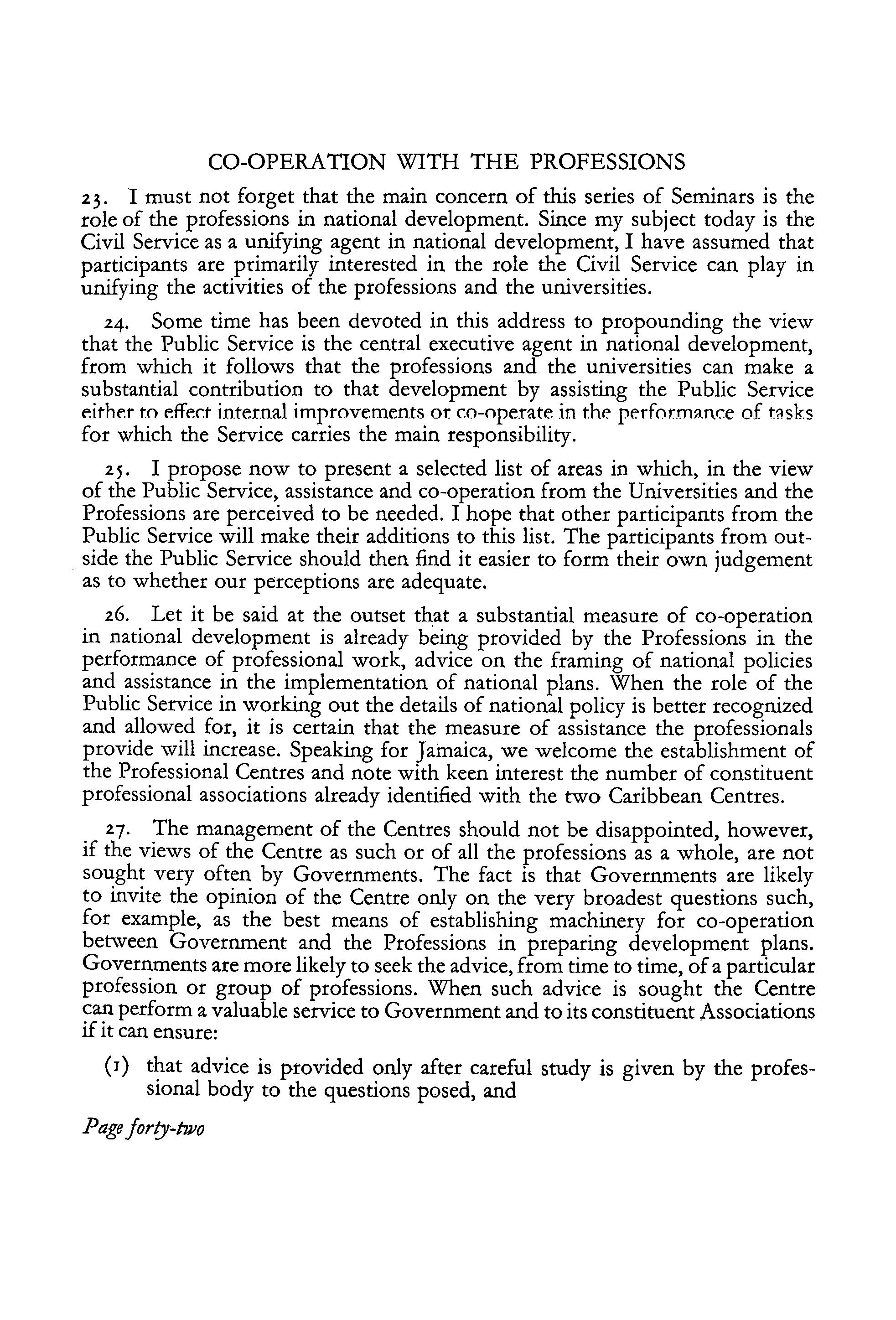
(z) the advice of the professional body is given entirely in the public interest -unless, of course, it is clear by the nature of the question itself that the Association is not required to advise for this purpose.
z8. May I turn now to some of the areas in which the Professions can be of most value to the Central Public Service in the development process. (i) We expect them to keep abreast of new developments in the application of technology, to sift these developments and encourage our communities to adopt those which offer the greatest promise of improved efficiency. (a) We expect the professions to be continually concerned with the problem of managing the monopoly of knowledge they enjoy and to keep us assured that the draft on the national income, which is the price of access to this knowledge, is always a fair one and does not take advantage of monopoly positions. () The Associations are uniquely positioned to expand the professional role in national development through manpower preparation and use. We would encourage each profession at the present time, except perhaps Medicine and Law, to propagandize young people while still of school age, to enter that particular profession. If they could be convinced that a normal distribution of a professional's working life is to devote the early years to Public Service, the middle years to private practice and the final years to Public Service once more, no co-operation or assistance in national development could be more valuable. We appreciate highly the contribution the professionals already make in the training of subprofessions in their various disciplines. We would like to see this contribution rapidly expanded. (1) We would invite the Associations to keep up-to-date and organized data on professional remuneration and conditions of employment in the public and private sectors. () We would welcome their opinions, from time to time, on the relative value of particular professional schools in other countries. (6) Ministries of the Public Service would be glad of the opportunity, from time to time, to compare public sector standards and work loads for particular grades of professional and sub-professional staff with those prevailing in the private sector.
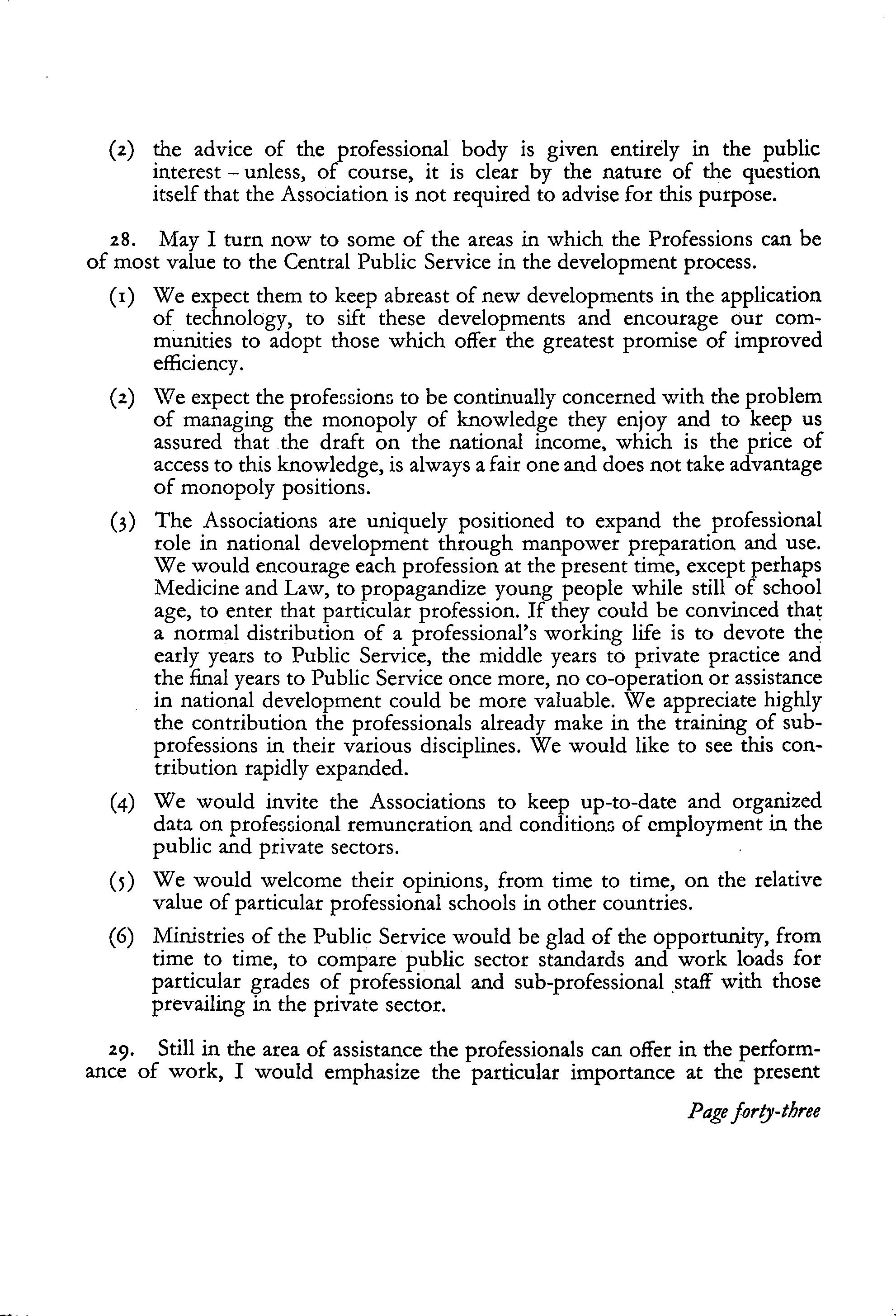
29. Still in the area of assistance the professionals can offer in the perform- ance of work, I would emphasize the particular importance at the present Page forty-three






